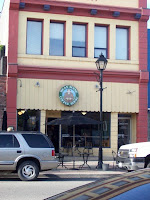I've grown up believing wholeheartedly that "Aspartame=Bad". Recently a colleague asked me what artificial sweetener was "safe" to use. What a great blog post idea!
Now, trying to decipher the paranoid from the conspiracies my mind is swirling. How complicated!
Aspartame
A quick recap of the Aspartame debacle: Introduced in the 1970's, it's an artificial sweetener that's made by combining two amino acids and is 200 times sweeter without the calories of sugar. Due to a ridiculous amount of controversy (take a quick look at wiki's entry and then HuffPo's recent article to see a drastic difference in opinion) it feels as though the regular consumer is spinning in circles as to who to believe. Although, after some reading, and the recent release by the European Food and Safety Association regarding a full discloser review of over 600 scientific datasets of the 30+ years of research on Aspartame, I would have to tentatively conclude that it is most likely safe.
A lot of Dr. Mercola's aggressive stance on Aspartame takes the stance of bias in research during the early 1970's and 1980's research and the involvement of Monsanto. Interestingly, Monsanto sold the rights to NutraSweet (Aspartame) in 2000, 12 years ago. In any case, take a quick peak at wiki's extensive and up to date research list as keep an eye out for when EFSA releases it's review of the 600 datasets (which will include independent scientific studies) in September 2012.
Beyond all this debate and controversy I feel as if a point has been missed. The environmental impact of processed and artificial sweeteners.
In 2002, NutraSweet was responsible for over 500,000 pounds of methanol pollution in Georgia's wastewater (Ecoholic 2006). Creating artificial sweetener's requires energy- as the further away from the original product you must journey, the more energy required to create the product.
Splenda, although made from sugar, still requires manipulation (ie energy= pollution) in order to reveal it's new form- sucralose cut with maltodextrin. Splenda has been accused of animal testing, from rabbits to beagles and have been the source of rising cyclohexane emissions in Alabama.
Stevia is derived from an herb in tropical and subtropical regions in western North America and South America. The EFSA have found stevia to be safe to ingest within certain intake parameters. In 2006 the World Health Organization also found no safety concerns in stevia (as per cited in Wiki and The WHO article 2006- p117). We Canadians can buy it freely- should be available in your Health Food Stores.
There's also organic agave syrup, which is tapped from a cactus plant. However, it's more of a honey substitute.
Xylitol is traditionally extracted from birch bark but can be extracted from all kinds of plants and is a sugar alcohol sweetener. According to wiki, it can result in temporary discomfort of bloating and diarrhea... ick. You also need to be aware of how the sweetener was harvested- chopping down forests of birch just for a kick of sweetener really isn't worth it. Look for pesticide, GMO-free corn husk derived Xylitol.
Yogis who don't care about the calories:
Sugar has been deemed one of the worlds most environmentally and socially damaging "food" product. Sugarcane crops have been deemed by the WHO to destroy more wetlands and biodiversity than any other along (as per cited in Ecoholic 2006).
- Choose as unrefined and organic as you can. Fair or Direct Trade is better as it assures no child or slave labour for your sugar (we get ours from JustUs!).
- Try some honey for a change. It can be local and sustainably produced. You get used to the flavour in coffee too!
For those wanting to reduce calories try following these guidelines while choosing a sweetener:
- The least amount of processing steps away from the original product the better. If you can identify a "real food/plant" item in a few short steps, you're automatically decreasing your environmental impact.
- Purchase locally when you can.
- Assure that the herb/product is cultivated sustainably. Wildcrafting isn't actually a good thing as it can damage fragile ecologies. A quick google search on the company can help.
- Organic and Fair/Direct Trade helps assure no damaging chemicals were used to grow your sweetener and the people who worked hard to cultivate it were treated and paid fairly.
Finally- try a few other types of substitutes like yogurt, applesauce, beets or honey to sweeten baked goods.
Do you have a fabulous yogurt, applesauce, beet or honey sweetener recipe? Please share!! I'm woefully lacking in that department :)
article copyright of EcoYogini at ecoyogini.blogspot.com












